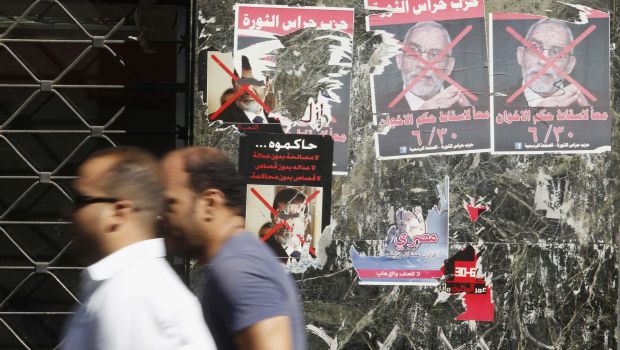
People walk in front of defected posters of ousted Egyptian President Mohamed Mursi and Muslim Brotherhood leader Mohammed Badie in downtown Cairo on August 29, 2013. (REUTERS/Amr Abdallah Dalsh)
Cairo, Asharq Al-Awsat—Despite being designated as a terrorist organization in December 2013, members of the Egyptian Muslim Brotherhood are seeking to retain a voice in post-Mursi Egyptian politics and even participate in the forthcoming parliamentary elections, say opponents of the movement.
Egyptian Conference Party spokesman Hossam El-Din Ali told Asharq Al-Awsat that the secularist centrist party had recently foiled an attempt to “Ikhwanize” the party. He said: “We uncovered an attempt by around 200 Muslim Brotherhood members to infiltrate our party in El-Sharqia Governorate . . . We refused to allow them to join after we learned of their prior affiliations.”
“We also have information that the Brotherhood will put to use some lesser-known or rich figures to head civilian parties,” he said.
Ali claimed that the Muslim Brotherhood could also seek to take over pre-existing parties, describing these parties as being members of the “new left” or “old liberalism.” He said: “I warn these parties against continuing to favor partisan over national interests.”
The Conference Party leader’s warnings came as Egyptian authorities continued their crackdown against the Brotherhood, after controversially sentencing 529 members to death in late March. Cairo has declared the Islamist movement a terrorist organization, making membership of the group or the circulation of its literature a criminal offense.
The interim government blames the Brotherhood for a number of attacks targeting state infrastructure of security and police officers. The Brotherhood denies those accusations.
The current leader of Egypt’s Constitution Party, Mamdouh Qanawi, told Asharq Al-Awsat that attempts by the Muslim Brotherhood to bypass legislation barring them from politics are not new, saying this was a common occurrence during the administration of former president Hosni Mubarak, when the Brotherhood was also a proscribed organization.
While members of the Brotherhood often ran as independent candidates, often openly during the latter days of the Mubarak era, Qanawi warned that the Brotherhood also attempted to “infiltrate” other parties.
“The Brotherhood made numerous such attempts, although my current party has not been subject to any like this. But I had a negative experience with this when I was part of the Labor Party. I was the first to raise the alarm bells when the Muslim Brotherhood tried to take over the party,” he said.
